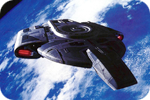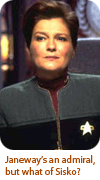
SPOILER WARNING: If you’ve not watched Star Trek: Deep Space Nine, then you’ll want to beware because there are spoilers ahead (some minor, some major). Now you know and knowing is half the battle.
Ask any Star Trek fan which series is their favorite and they’re likely to tell you Star Trek: The Next Generation. Like the original series, Next Generation was created by Gene Roddenberry and was full of imaginative stories, strong characters and top notch production values. Given all this, it’s no wonder TNG forms the bedrock of the modern Star Trek franchise. But from the futuristic utopia that was Roddenberry’s Next Gen universe, sprung the series I’ve come to regard as my favorite – Deep Space Nine. Considered by many to be the “troubled middle child”, caught between Next Generation and Voyager, Deep Space Nine never received the critical praise or audience numbers it deserved.
Thanks to my friend Corey and his DS9 DVD collection, I’ve been watching Deep Space Nine from season 1 for the better part of a year. Like most TV shows, DS9 started out rocky. Episodes devoted to the “problem of the week” along with actors and directors who were unsure of the character’s motivations led to some wild over-acting and sloppy story lines early on. But unlike Next Generation which peaked in season 4 & 5 and Voyager which was barely exciting for much of its run, Deep Space Nine only got better the longer it ran.

Despite being born in the shadow of The Next Generation, Deep Space Nine quickly found its footing and by season 3 all pistons were firing. Producers had introduced the Starship Defiant to take our heroes on missions of exploration and adventure away from the station. A new, deadly enemy called The Dominion, with a dark and complex backstory was introduced that would lay the ground work for some of the best story lines in seasons 6 & 7. Strong relationships formed between major characters like Odo & Kira and Worf & Dax. Writers like Ron Moore of modern Battlestar Galactica fame, pushed studio heads to allow multi-episode story arcs, something that was frowned upon for a weekly series that needed to stand alone in syndication.
Like many fans, I could probably fill a book with all of the aspects of the show that I love. I won’t go into that level of detail but I did want to share some of my favorite parts. In no particular order, here are just some of the things I appreciate whenever I watch Deep Space Nine:
• Sisko, The Emissary – Not only did Deep Space Nine tackle a tough and controversial subject like religion, but it boldly wove it into the fabric of the DS9 universe. Making Sisko not only a heroic Starship Captain, but also a religious icon was a stroke of genious on the creator’s parts. Watching him evolve from a bitter man who lost his wife at the hands of the Borg, to become the most beloved person of the Bjorian faith was both satisfying and unexpected.
• The Ferengi – Hats off to DS9’s writers as well as the actors who played all of the Ferengi. They took two-dimensional characters driven purely by profit and injected serious helpings of loyalty, family and much needed comedy into the Ferengi lore. DS9 did for the Ferengi, what Next Generation did for the Klingons, move them beyond simple charactatures and into the realm of “real people”. I especially love Rom’s devotion to Quark despite his brother’s often less-than-stellar treatment of him. Ferengi episodes were always winners in my book.
• Worf & Dax – Simply put, one of the best reasons to watch the show. Worf had always been a favorite on Next Generation, and with Deep Space Nine, the character was given a chance to grow beyond battles and bat’leths. Their devotion to each other along with their ability to overcome seemingly impossible differences put smiles on fan’s faces. The wedding episode “You Are Cordially Invited” was a series highlight and gave us a peek inside Klingon culture no fan will soon forget. When Dax died at the end of season 6, it left a huge hole, not only in Worf’s heart, but in ours too.
• Vic Fontaine – During the original run of DS9, I positively hated Vic Fontaine episodes. The holographic night club singer, played so cooly by real-life crooner James Darren, often got in the way of stories about the Dominion or the Prophets or something else of fan interest. But as the years have passed, I realized just how great Vic was and how his stories were necessary diversions from the weight of heavier plot lines. The Vic Fontaine episodes “His Way” and “Bada Bing, Bada Bang” are now among my all-time favorites.
• Bashir & O’Brian – Every Trek series nurtures key relationships between characters and Deep Space Nine was no different. The growing bond between Miles O’Brian and Julian Bashir was a delight to watch unfold. It formed the basis of many solid stories and grounded the two characters in a reality that all of us could relate to. On their own, I can’t say I really liked Bashir or O’Brian, but their chemistry together was undeniable.
• In The Pale Moonlight – Without a doubt, my favorite episode of Deep Space Nine, it highlights the incredible acting skills of Avery Brooks and Andrew J. Robinson. The story takes several twists and turns and shows just how committed Captain Sisko is to winning the war with the Dominion. It should have won an Emmy for writing, but like all of Star Trek when it comes to winning important awards, it’s overlooked. Pity that.
• Jeffrey Combs – A skilled character actor, Combs brought flair and depth to any number of characters he played on DS9. My personal favorite had to be the conniving yet obsequious Weyhoun. Comb’s delicious exchanges with Marc Alaimo as Gul Dukat were a feast for Trek fans everywhere as was his ability to portray a villain you loved to hate. Combs’ talent was also evident as one of the bright spots in the bottomless pit that was UPN’s Enterprise. His portrayal of the Andorian Captain, Shran, actually kept me tuning in long past the point of no return.
• Morn – Always seen but never heard, the ever-present patron of Quark’s Bar started as bit part but quickly became a fan favorite. Just knowing Morn was sitting at the bar week after week gave fans like myself an in-joke that only other Niners could appreciate, and for that, we loved him to death.
All of these things, and more, made Deep Space Nine one of the best dramas on television for the seven seasons it was on TV. Near the end, the show lost much of its staff to the creative leech that was Star Trek: Voyager. Paramount’s efforts to launch the now defunct UPN network meant less money, less promotion and poor time slots that ultimately forced DS9 to end its run in 1999.

Unfortunately, unlike TNG’s crew or even Voyager’s, Trek fans have never been blessed with an appearance of any DS9 character in a single Trek film or subsequent series. In 1999’s mediocre Star Trek: Insurrection, we learned that the newly returned Janeway had been promoted to Vice Admiral. In 2002’s Star Trek: Nemesis, long time TNG characters Riker and Troi were finally married. Will we ever learn the fate of Captain Sisko or discover what became of Odo, the Great Link and the Dominion? What of Rom’s efforts to bring change to the Ferengi Alliance as Grand Nagus?
In death, as in life, Deep Space Nine remains the black sheep of the Trek family. Someday perhaps Niners will be lucky enough to have Paramount revisit the fates of Captiain Sisko, Colonel Kira, Quark and the rest. In the meantime Deep Space Nine will continue to be this fan’s very favorite Star Trek series and perhaps one of my favorite shows of all time. Thank the Prophets for DVDs.